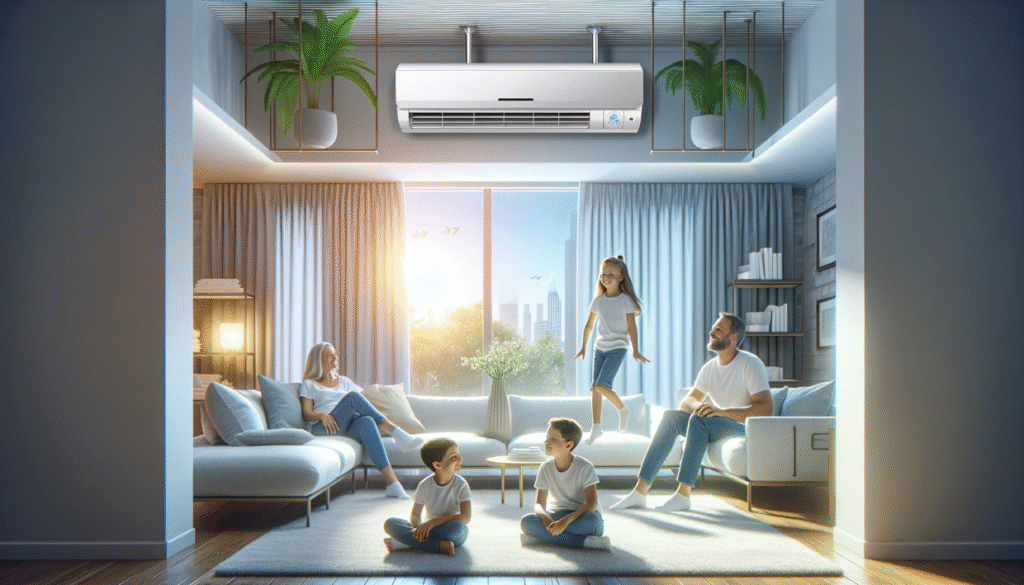HVAC systems play a central role in shaping the comfort, livability, and overall environment inside a home. From regulating temperature to managing humidity and ensuring clean airflow, these systems significantly impact the comfort level of each room throughout the year. A well-functioning HVAC system creates a balanced indoor climate that supports daily routines, promotes better sleep, and contributes to a healthier lifestyle. When the system is properly designed, maintained, and tailored to the home’s needs, it operates quietly in the background to maintain stable conditions. For homeowners, understanding how HVAC systems impact comfort can help inform decisions about maintenance, upgrades, and energy use, enabling them to create a space that feels consistent and inviting.
Temperature Control and Seasonal Comfort
Temperature regulation is one of the most noticeable impacts of an HVAC system on home comfort. A reliable system maintains a steady indoor temperature, even as outdoor weather conditions change, helping each room feel warm in winter and cool in summer. Without proper temperature control, a home can develop hot and cold spots that make living areas feel inconsistent or uncomfortable. Modern systems can automatically adjust output to maintain consistent temperatures, eliminating the need for frequent thermostat adjustments. For homeowners seeking additional guidance, working with an HVAC contractor in Barrie can help ensure the system is sized correctly and calibrated for the local climate. When the HVAC system operates efficiently, it reduces temperature fluctuations, supports restful sleep, and allows families to enjoy their living spaces comfortably throughout the year. Proper temperature control also contributes to lower energy usage, minimizing strain on the system while maintaining comfort.
Humidity Balance and Indoor Air Quality
Humidity plays a significant role in determining the comfort level of a home. When humidity is too high, rooms can feel sticky, warm, and difficult to cool, while low humidity can cause dry air that irritates skin, throats, and sinuses. HVAC systems help maintain a healthy balance by removing excess moisture in the summer and supporting proper humidity levels in the winter. Balanced humidity not only improves comfort but also helps protect the home’s interior. Excess moisture can lead to mold growth, warped wood, and musty odors, while dry air may contribute to cracking paint or furniture. Airborne particles, such as dust and pollen, also become more manageable when humidity levels remain within a comfortable range. HVAC systems with built-in humidity controls or connected humidifiers and dehumidifiers enhance air quality, making it easier to breathe and reducing allergens. Maintaining proper humidity through the HVAC system ensures a cleaner, healthier indoor environment that supports long-term comfort.
Ventilation and Airflow Efficiency
Proper ventilation is essential for circulating fresh air and preventing indoor air from becoming stale or stagnant. HVAC systems help remove pollutants, odors, and airborne irritants by bringing in fresh air and distributing it evenly throughout the home. Efficient airflow ensures that conditioned air reaches every room, preventing uneven temperatures and improving overall comfort. When airflow is restricted by clogged filters, blocked vents, or inefficient ductwork, the system struggles to maintain comfort levels, and energy usage increases. Ensuring that air moves freely enhances the effectiveness of both heating and cooling. Appropriate ventilation also helps control indoor contaminants from activities such as cooking, cleaning, or everyday household movement. By supporting strong airflow and removing pollutants, HVAC systems enhance the quality of the air you breathe, thereby contributing to your comfort and overall well-being. Consistent airflow also allows the system to run more efficiently, reducing strain and extending the lifespan of HVAC components.
Energy Efficiency and Long-Term Comfort
Energy efficiency is closely tied to home comfort because an efficient system maintains stable temperatures without overworking or causing unexpected breakdowns. When an HVAC system is properly maintained, sealed, and calibrated, it consumes less energy while delivering consistent heating and cooling. Efficient systems warm or cool rooms more effectively, reducing discomfort caused by slow temperature changes or uneven air distribution. Factors such as insulation, duct design, and thermostat placement significantly impact how effectively the HVAC system manages energy. Upgrading older systems or improving connected components, such as thermostats and ductwork, can dramatically increase efficiency and create a more comfortable living environment. By operating smoothly and predictably, an efficient HVAC system reduces noise, maintains steady temperatures, and minimizes sudden shifts that disrupt comfort. Over time, these improvements not only save energy but also enhance daily living by ensuring consistent indoor conditions.
System Maintenance and Its Impact on Comfort
Regular maintenance is crucial for ensuring an HVAC system continues to deliver comfort reliably. Tasks such as changing filters, cleaning components, and checking for leaks keep the system performing at its best. Without proper maintenance, dust buildup, worn parts, or airflow restrictions can cause the system to struggle, resulting in reduced comfort and higher energy costs. Maintenance also helps identify small issues before they escalate into larger problems that disrupt indoor comfort or require costly repairs. A well-maintained system distributes air evenly, responds quickly to thermostat changes, and operates more quietly. Consistent upkeep also extends the lifespan of the HVAC equipment, ensuring homeowners enjoy stable comfort for years. By prioritizing maintenance, families can avoid unexpected breakdowns during extreme weather and maintain a comfortable home environment throughout the year.
HVAC systems have a profound impact on home comfort by controlling temperature, managing humidity, supporting ventilation, and improving air quality. When properly designed, maintained, and operated, they create an indoor environment that feels stable, clean, and inviting. Efficient HVAC systems reduce energy usage while maintaining comfort and preventing issues that disrupt daily living. Regular maintenance further enhances performance, helping homeowners avoid discomfort and unexpected repairs. By understanding the role HVAC systems play in overall comfort, homeowners can make informed decisions that support a healthy, efficient, and enjoyable home environment throughout the year.






